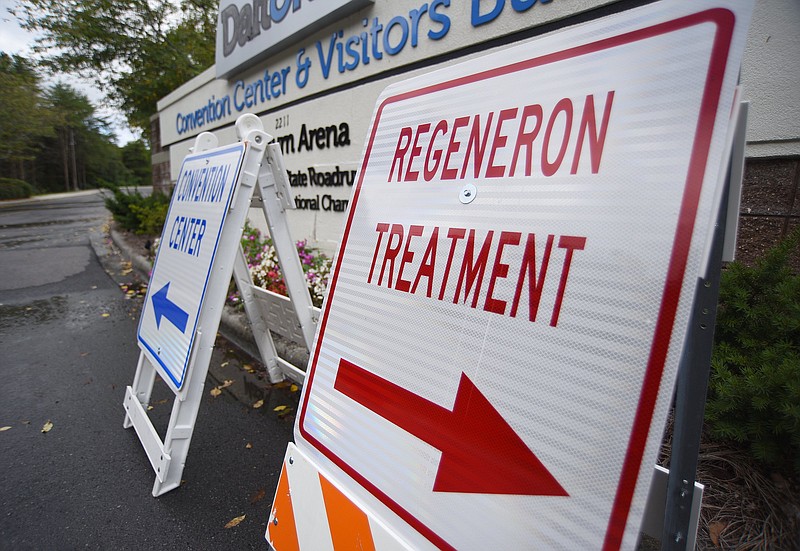Tennessee health officials are scrambling to increase depleted stock of monoclonal antibody treatments amid a nationwide shortage as all but one version of the drugs they've relied on to keep COVID-19 patients out of hospitals are proving ineffective against the omicron variant.
Tennessee Health Commissioner Dr. Lisa Piercey said that supplies of the drugs are "extremely scarce" and not expected to increase for several weeks.
The state's limited allotment of monoclonal antibodies was a concern during the summer's delta wave. The issue, which has resurfaced in the face of a new COVID-19 surge fueled by omicron, is heightened by data showing a treatment called sotrovimab is the only monoclonal antibody currently available that thwarts the coronavirus.
On Dec. 23, the U.S. government paused distribution of the other COVID-19 antibody treatments - made by Regeneron and Eli Lilly - saying the therapies were unlikely to be effective against the omicron variant, according to a joint statement from the assistant secretary for preparedness and response and the Food and Drug Administration.
Omicron is now the dominant coronavirus strain in the Chattanooga region and across the nation.
"If that weren't enough bad news, the next piece of bad news is that [sotrovimab] supply is extraordinarily limited," Piercey said during a news briefing last week. The state was told it would get 810 doses last week, which it did. However, federal partners also told the state that "we won't get any more until at least the week of Jan. 3, [and] it could be the week of Jan. 10."
Jacob Standefer, a pharmacist and CEO of Access Pharmacy in Hixson, on Monday said the current demand and supply constraint is "as bad as we've seen" since the pharmacy began offering monoclonal antibodies about a year ago.
Access received a shipment of 66 doses of sotrovimab on Friday, and Standefer said those will be used up tomorrow.
"Right now, we're in panic mode, that's for sure," he said. "We've got nurses and staff to treat up to 70 people a day, but we don't have the product, and we have no clue when it's going to change. We just know that we have one therapy that works against omicron."
The Biden administration is working with the company that manufacturers the drug to secure more doses that hopefully would be delivered in early 2022, according to The New York Times.
The state will rely on providers to ensure they're administering the limited amount of therapy to those who are at highest risk for serious illness and death, Piercey said.
Standefer said the situation is forcing providers across the state to have "a lot of tough phone calls" with patients.
"We're just doing what we can to talk with the patients through their symptoms, what they can take for it and then if they're having any shortness of breath that they need to go to the hospital," he said.
Monoclonal antibodies are laboratory-made proteins given through intravenous infusion that work by mimicking the antibodies that target the coronavirus to help speed recovery for people with mild to moderate COVID-19 whose symptoms began within 10 days. People who are 65 and older and those with weakened immune systems or chronic conditions such as obesity, diabetes and heart disease are good candidates for the treatment.
A page on the Tennessee Department of Health website allows users to search for facilities in their area that offer the treatment. The page has a warning that the drugs are in "extremely low supply" and advises people to consult with their physicians about their risk factors.
Calls to several other area health providers about whether they had the drugs were not returned.
Further complicating Tennessee's ability to combat omicron, Piercey said she had no idea when the state would receive shipments of the highly-anticipated oral antiviral pills - one of which was expected to arrive earlier in the month - that treat COVID-19 infection in high-risk individuals.
The U.S. Food and Drug Administration last week authorized the first two treatments, one from Pfizer and one from Merck, for COVID-19 that come in an easy-to-use pill form that is taken orally and meant to prevent hospitalization.
(READ MORE: New easy-to-use COVID-19 pills come with a catch)
"We still don't have a timeframe on those yet. We're talking to our federal partners several times a week - almost daily - and we keep being told that it's forthcoming, but I don't yet have those in the state," Piercey said.
Despite the current shortage of therapies, there is a new option for patients whose immune systems are severely compromised - such as those undergoing chemotherapy or organ transplants - to the point that vaccines are unlikely to provide them protection from COVID-19.
Piercey said the department has been distributing this "combination monoclonal antibody product," which is given every six months in lieu of a vaccine as a "pre-exposure prophylaxis" to prevent infection, to select medical centers in the state that treat these types of patients.
"This is a very unique and small population in our state," she said, encouraging immunocompromised Tennesseans to call their doctors to inquire about the product and find a location where it's available.
Contact Elizabeth Fite at efite@timesfreepress.com or follow her on Twitter @ecfite.
